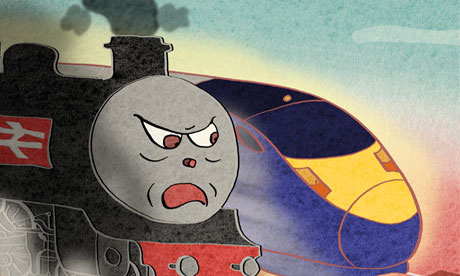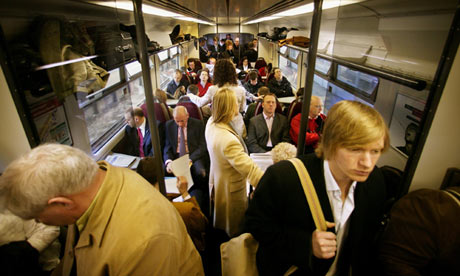
Privatising the railways was a disaster. It's time to renationalise
Passengers are paying a fortune to travel in overcrowded trains, so Labour, like the Greens, should seize the initiative

'The solution the Green party is proposing is for our railways to be brought back into public hands, with passengers having a greater say in the development of the system.' Photograph: Bruno Vincent/Getty Images
"No direction", "dithering", "rudderless". Ed Miliband isn't the first opposition leader to hear this kind of language as an election looms, so perhaps we shouldn't be surprised that his MPs are queuing up to offer him friendly encouragement to fill the policy vacuum.
Clearly, it's not easy being in opposition, knowing that every policy announcement can and will be used against you by the government and a hostile media. But that's why politics requires courage.
Labour now has some fantastic opportunities to get behind progressive policies that would resonate with its traditional support and with voters. One in particular is about to pull into the station. With the dreadful news last week that rail fares will go up by an average of 4.1% next year (and sincere sympathies to you if you're one of the many passengers who will be hit much harder than that), it's surely time for Labour to accept that privatisation of the railways was a disastrous failure that it should have reversed when it had the chance.
With the prime minister's former speechwriter, Ian Birrell, leaping to the defence of privatised services and talking about record levels of passenger satisfaction, surely now is the time for Miliband's team to sign up to a policy that would genuinely distinguish him from the coalition. The shadow transport secretary, Maria Eagle, sounds as if she wants to head in that direction. She recently criticised the government's determination to re-privatise the East Coast service, calling it "bizarre and dogmatic". East Coast, she noted, makes one of the highest payments to the public purse, receives the least subsidy and is the only route on which all profits are reinvested in services. So why doesn't Labour go the whole way?
The Rebuilding Rail report, published last year by Transport for Quality of Life, offers a superb analysis of the mess Britain's railways are in. It finds that the private sector has not delivered the innovation and investment that were once promised, that the costs of back-room staff have massively increased, and that the costs of train travel rose by 17% between 1997 and 2010 (while the costs of travelling by car fell). It conservatively estimates that £1.2bn is being lost each year as a result of fragmentation and privatisation. The irony is that some of the biggest profiters are the state-owned rail companies of our neighbours: Deutsche Bahn, for example, owns three UK franchises.
Birrell seeks to paint opponents of privatisation as dewy-eyed nostalgists. But the modern, efficient, clean, affordable services enjoyed in other parts of Europe offer a much better blueprint than our own past. The solution the Green party is proposing is for our railways to be brought back into public hands, with passengers having a greater say in the development of the system. The government would take back individual franchises when they expire, or when companies fail to meet their conditions. The enormous savings generated could and should then be reinvested in rail infrastructure, and to reduce the soaring cost of fares.
My private member's bill sets out the process to make this happen, and is due to have its second reading in October. I've written to Maria Eagle asking if Labour will get behind it. As a policy for Labour, it's unlikely to play well in the Mail and the Telegraph. But I suspect many of their readers – particularly those reading their papers while jammed up against a fellow commuter on an overcrowded, overpriced train – might be more receptive. And certainly there are many rank and file Labour MPs, many of whom are already backing the bill, who are desperate to see their leader prove himself as theconviction politician he says he is.
--------
Forget the nostalgia for British Rail – our trains are better than ever
Passengers may be grumbling about the planned fare increases, but on balance rail privatisation has been a huge success
'For all the defects of a rushed privatisation, rail has evolved into a privately run public transport system playing a critical and successful role in the economy.' Illustration by Satoshi Kambayashi
There is a weary predictability to the political choreography. Once again, it's revealed,commuter rail fares are rising above the rate of inflation, squeezing the cost of living still further for hard-pressed families. Ministers claim they checked bigger increases; the opposition pretends it would have done differently; passenger groups scream in pain; and the unions demand a return to state ownership.
This is one area where union conservatism strikes a chord with the British public, long sceptical over the supposed benefits of rail privatisation. Many regular users see it as little more than a modern-day train robbery, with fat cat bosses cramming passengers into carriages and creaming off vast profits from creaking services. Surveys show two-thirds of voters would happily see the railways renationalised, an idea being considered by Labour.
As so often, conventional wisdom is wrong. For all the defects of a rushed privatisation, rail has evolved into a privately run public transport system playing a critical and successful role in the economy. The reality could hardly be more different to perception: passenger numbers booming, productivity rising, the number of services soaring, and customer satisfaction at near-record highs. Even those hated fare rises are not all they seem.
Modern vision is clouded by misty-eyed nostalgia for lovely old trains that once trundled around our tracks. As we hurtle along in slick modern trains with Wi-Fi and friendly service, it is easy to forget the poor punctuality and filthy carriages in the dismal days of British Rail. It was crippled by decades of under-investment, driving up fares and driving away freight – but even Margaret Thatcher saw the sale of the railways as a step too far. It was left to her successor, who forced it through too fast with civil servants told to privatise "as soon as practicable" and ensure the process was irreversible.
As one former rail boss said, the plan was half-hearted and half-baked; it was so unloved even Lord Whitelaw, Thatcher's long-suffering deputy, opposed the idea. The result in political and financial terms was a disaster, symbolised by executives of three rolling-stock firms handed the most obscene profits on a plate. The architecture of privatisation was flawed – an attempt to impose models from other industries on a complex transport system – but the ambition to introduce competition and private capital was sound.
Two decades later, some – although far from all – of the kinks have been ironed out. There remain, for example, issues over inflated hidden subsidies handed to the train operating companies. And while public spending on the railways has soared, Network Rail remains wasteful and guilty of inadequate management yet its bosses take big bonuses. The transport secretary, Patrick McLoughlin, should have slammed their greed rather than supported them earlier this week.
But focus on the facts. When I travel from London to watch my football team, Everton, play at home, the average journey time to Liverpool is now 37 minutes quicker than when rail was privatised. This makes a difference on a trip that is now little more than two hours. There are also more options available for travel; on some major routes, more than twice as many trains are running. Britain has an additional 4,000 services a day, a rise of one-fifth that ensures the most frequent services among eight European nations tested by a consumer group. And we have the safest railways on the continent.
The ultimate test of any market is its popularity. Here again, rail can claim success despite intense competition from bus companies and budget airlines, which only took off in this country after rail privatisation. When the plan was first promoted, Britons took on average 11 train trips a year; now we take twice that number. Since the turn of the century freight traffic has risen substantially and passenger numbers have soared by 49% – far more than under those admired state-run services in France, Germany and the Netherlands. This means the level of subsidies per passenger has fallen while revenues to Whitehall have risen by more than £1bn.
Passengers grumble with justification over a maze-like ticketing system, yet these price variations have ensured rail companies can compete on longer journeys with rivals in the air and on the roads. So yes, the cost of some fares is now ridiculous; with travellers often stung by hideous sums for peak-time travel – but away from the headlines and cries of outrage, many fares and season tickets have fallen in real terms. One test on a price comparison website found journeys in Britain mostly cheaper than similar-length jaunts in France and Germany. Overall, the average price per passenger mile has risen only 4% in real terms over the past 15 years.
More investment, more competition and more pressure on the corporate fat cats are needed. But our focus should be on improved regulation, not a reversion to failed models; indeed, in many ways rail demonstrates the potential of a part-privatised public service at a time when such policies are causing concern in other sectors. Britain should, as with other national institutions, stop being dazzled by nostalgia, ignore the groans of vested interests and focus on keeping an unlikely success story on track.

